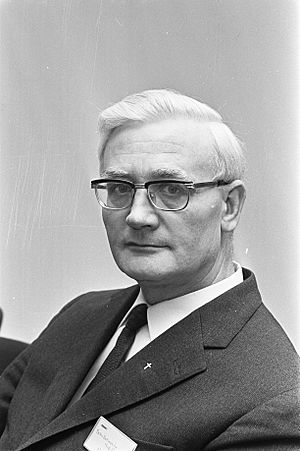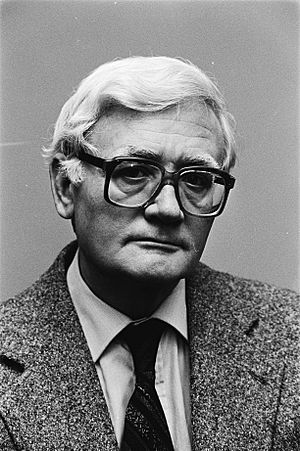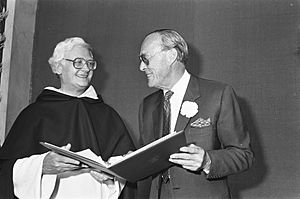Edward Schillebeeckx facts for kids
Quick facts for kids
The Reverend Dr.
Edward Schillebeeckx
|
|||||||
|---|---|---|---|---|---|---|---|

Schillebeeckx in 1979
|
|||||||
| Born | 12 November 1914 Antwerp, Belgium
|
||||||
| Died | 23 December 2009 (aged 95) Nijmegen, Netherlands
|
||||||
| Nationality | Belgian | ||||||
| Other names | Edward Cornelis Florentius Alfonsus Schillebeeckx | ||||||
| Awards | Erasmus Prize (1982) | ||||||
|
|||||||
| Alma mater | Le Saulchoir | ||||||
| Scientific career | |||||||
| Institutions | Catholic University of Nijmegen | ||||||
| Influences | Dominicus De Petter | ||||||
Edward Cornelis Florentius Alfonsus Schillebeeckx (November 12, 1914 – December 23, 2009) was a Belgian Catholic theologian. A theologian is someone who studies religion and God. He was also a member of the Dominican Order, which is a group of Catholic priests and brothers.
Schillebeeckx taught at the Catholic University in Nijmegen, Netherlands. His books about theology were translated into many languages. He became well-known around the world for his important work during the Second Vatican Council.
Contents
Early Life and Becoming a Priest
Edward Schillebeeckx was born in Antwerp, Belgium, on November 12, 1914. He was the sixth of 14 children in his family.
He went to school with the Jesuits in Turnhout. In 1934, he joined the Dominican Order. He studied theology and philosophy at the Catholic University of Leuven. In 1941, he became a Catholic priest.
After his studies, he moved to Ghent. There, he was greatly influenced by his teacher, Dominicus De Petter. Edward also served in the Belgian Armed Forces for a short time before and during the start of World War II. After the war, he continued his studies at a Dominican center near Paris. Here, he learned about modern Catholic theology.
His Studies and Teaching
In 1946, Edward Schillebeeckx completed his doctoral studies in Paris. In 1952, he published his doctoral thesis, which was a big research paper. Its title was De sacramentele heilseconomie, which means The redeeming economy of the sacraments.
After this, Schillebeeckx became a leader at a philosophy study house in Leuven. In 1958, he became a professor at the Catholic University of Nijmegen in the Netherlands. He taught dogmatic theology, which is the study of religious doctrines. His first lecture introduced Dutch theologians to a "new theology" movement.
Working with the Second Vatican Council
During the Second Vatican Council, Edward Schillebeeckx was a very active theologian. The Second Vatican Council was a major meeting of Catholic bishops from around the world. It took place from 1962 to 1965.
Schillebeeckx helped write many important documents for the Dutch bishops. He also gave talks about new ideas in theology to many bishops in Rome. His ideas helped shape some of the council's important documents, like Dei verbum and Lumen gentium.
He was especially involved in discussions about the role of bishops in the Church. He believed that the Church should focus more on the idea of bishops working together. This would balance the strong focus on the Pope's authority that had developed over time.
Even though he wasn't officially a "peritus" (an expert advisor) at the council, his influence was very strong. He had more time to talk to the bishops and explain the "new theology" that was developing.
In 1963, he helped start a new theological journal called Concilium. This journal supported "reformist" ideas, meaning ideas that aimed to update and improve the Church.
Later Life and Work
After the Second Vatican Council, Schillebeeckx started to focus more on studying the Bible. He believed that older ways of thinking about theology didn't always match the original writings of important thinkers like Thomas Aquinas.
He also wrote about sacraments in a new way. He saw them as personal meetings with God, similar to how Jesus met people. His book Christ the Sacrament of the Encounter with God became very well-known.
Schillebeeckx also looked at questions about priests, like whether they should be allowed to marry. He played an important role in discussions about these topics in the Netherlands. He was known as a leading Dutch-speaking theologian of his time.
Edward Schillebeeckx lived in Nijmegen, Netherlands, until his death. He taught at the Catholic University of Nijmegen until he retired. In 1982, he received the Erasmus Prize, a very important award for people who have made great contributions to European culture. He also received the Gouden Ganzenveer in 1989. He passed away on December 23, 2009.
Edward Schillebeeckx Foundation
The Edward Schillebeeckx Foundation was started in Nijmegen in 1989. This foundation collects and keeps all of Edward Schillebeeckx's writings and materials about him. Its goal is to make sure his important work and ideas are saved for the future. The foundation also supports a special teaching position at Radboud University Nijmegen.
See also
 In Spanish: Edward Schillebeeckx para niños
In Spanish: Edward Schillebeeckx para niños



